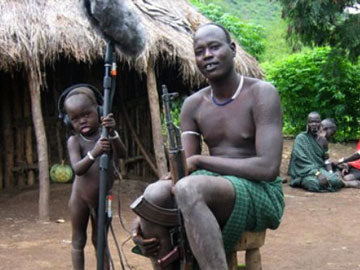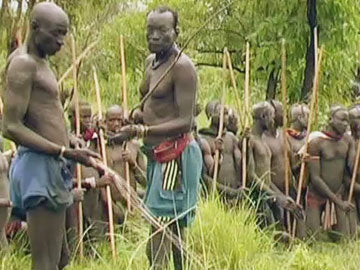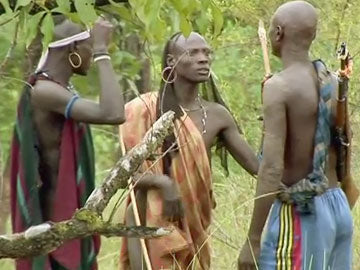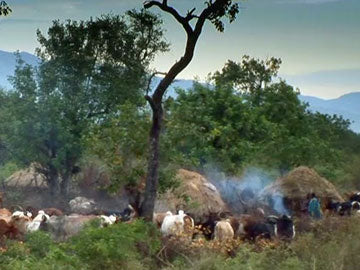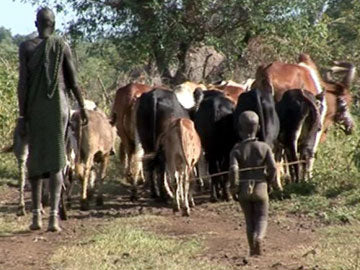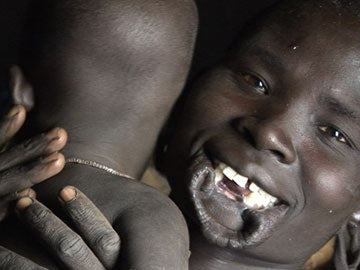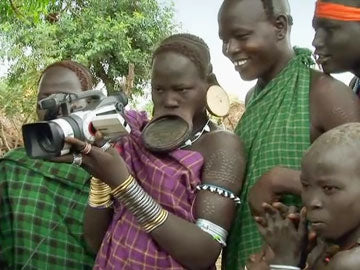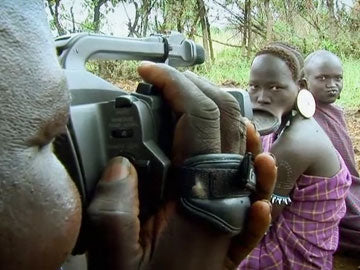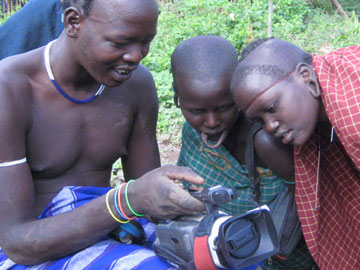Shooting with Mursi
EDUCATIONAL DIGITAL DOWNLOAD: For self-hosted school servers $400 (download above, includes caption file).
PAL DVDs: ALL REGIONS (ONLY PAL IS AVAILABLE AT THIS TIME)
Universities, Businesses (includes Public Performance Rights) $195
K-12 Schools (includes PPRs) $89
Public Libraries (includes PPRs) $49
WATCH NOW ON THESE PLATFORMS




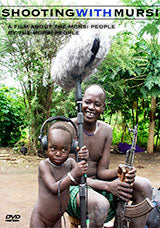
Olisarali Olibui, a member of one of Africa’s most isolated tribes carries a Kalashnikov in one hand and a camera in the other, with which he chronicles the struggle of his tribe to protect their land and way of life. The Mursi are an Ethiopian tribe of fewer than nine thousand people, a nomadic group of pastoralists who live in an area of the Omo valley the size of Wales.
Olisarali Olibui grew up in remote Mursiland where, after seeing westerners with cameras, he realised that film making was a way of showing the world Mursi culture. In 2000 Olisarali Olibui went to Australia where he learned English and returned with a video camera, a laptop and a solar charger. He decided to use the kit to portray his people’s lifestyle and culture and to give them a voice. And the Mursi certainly have a voice.
When Olisarali interviews his people on camera they feel constrained by no inhibition, shyness or reticence. They open up freely to one of their own and the subtitled translations of their comments are well observed and frequently hilarious.
The Mursi live in a Kalashnikov culture. Pressured on all sides by national parks and traditional enemies, the tribes constantly fight and raid each other for cattle. For cattle are the currency by which a man’s wealth is measured. Thirty eight cows and a Kalashnikov for a wife. They drink the blood of cattle mixed with milk, eat sorghum and corn and pick wild coffee. In the dry season they move near water. In the rainy season they seek out the lushest pasture for their precious cattle.
Produced and directed by Ben Young, Shooting with Mursi was made at an interesting time because roads are being built and tourists are appearing; to gawk, to snap and to underpay the Mursi. This film may well prove to be an historic record of a way of life doomed to extinction or major change.
The women say lip plates are a mark of beauty prized by men and women alike. All the viewer can think of is how do they eat. Or kiss. They take them out in the grass hut villages and put them in again when tourists appear.
The Mursi have no single leader and no system of arrest. They arrive at decisions by meeting until a consensus is reached. If one member of an age set misbehaves, the entire age set gets punished. So we have the spectacle of the film-maker himself being beaten by elders with sticks as part of an age set that caused trouble. This is the first time this ritual has ever been filmed.
The nearby national parks and game reserves are a big problem to the Mursi. While rich tourists spend up to $3000 a day shooting without mercy, the tribes people are not allowed inside. Nor are their cattle. The Mursi feel they have not been properly consulted about the parks.
Nobel prize winning economist Joseph Stiglitz pops up from somewhere to declare that in his view pastoralists need to be better organised if they are to preserve some of the characteristics of the nomadic lifestyle.
In an effort to initiate some organisation, The film ends with a large gathering of pastoralist tribes in Nyangatom in southern Ethiopia where, there is much talk of peace and appeals for peace. Peace, it seems, is the prerequisite for progress in pastoralist society. Shooting with Mursi is indeed well named.
Paul Sullivan, 30th March 2009
Directors: Ben Young, Olisarali Olibui
Country: Ethiopia / UK
Year: 2010
Running Time: 55 mins
DVD format: PAL, all Regions
FILM SCREENINGS AND AWARDS
Winner Special UNESCO Award - Millenium Film Festival, Brussels 2011
Winner Best Documentary - National Geographic All Roads Film Festival 2010.
Honourable Mention for Olisarali Olibui - Jean Rouch Film Festival, Paris 2010.
Official selection - San Francisco Green Film Festival 2011.
Official Selection - Mountainfilm at Telluride 2010.
Official Selection - Margaret Mead Film Festival, New York 2010.
Official selection - Goettingen Film Festival, Germany 2010.
Official Selection - Vancouver International Film Festival.
The film was also chosen for a special screening at The European Parliament with a Q&A afterwards.
The event aimed to promote awareness of the 8 Millennium Development Goals.










